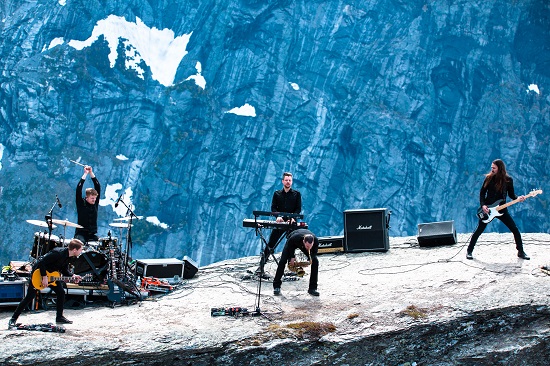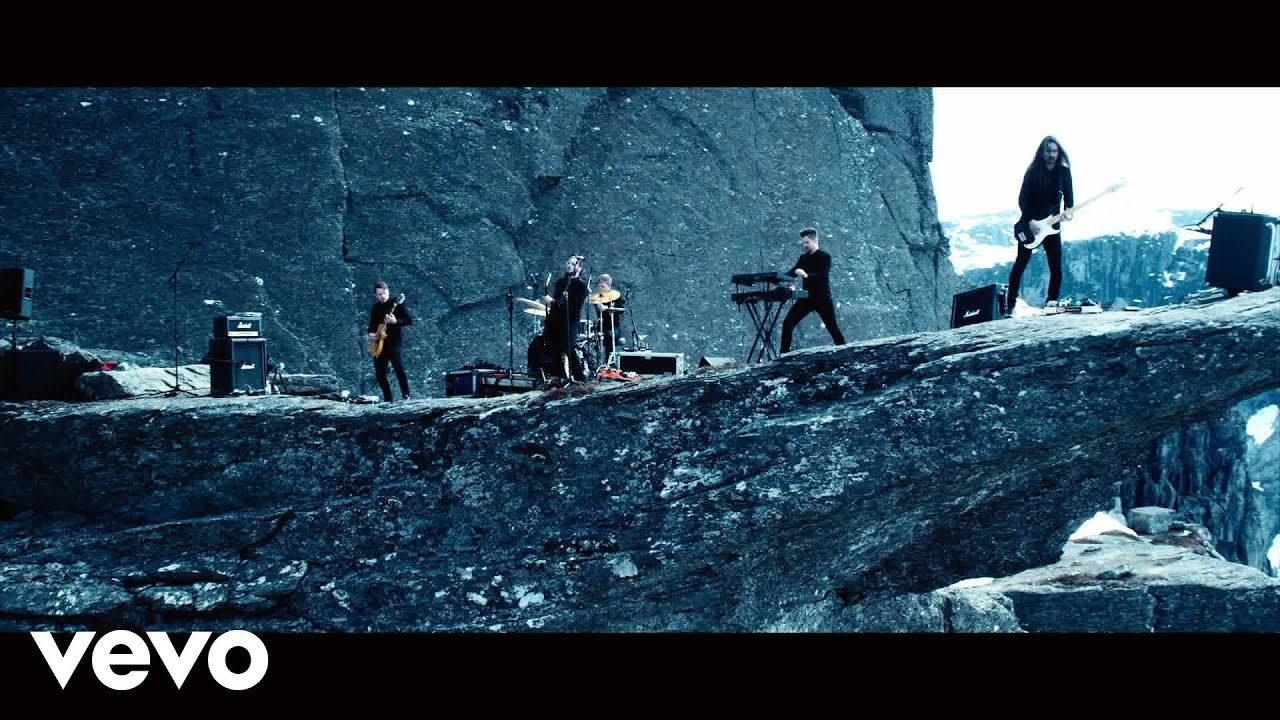Photographs by Jarle Hovda
“From the moment I entered the helicopter on the way up, I was high as a spaceship [because of] adrenaline, but it was all so surreal. Helicopters flying over my head and film drones buzzing around. I was half a metre from the edge and certain death, the snow everywhere around was blinding, and the thin, icy air added dizziness to my already overwhelming [fear of heights]. And in the middle of all this we were blasting our Blackjazz music out of huge amps and speakers to a couple of hundred people in full mountaineering attire on the other side of the abyss, that had hiked up to the top for five hours to see the show. And in the back of my head I just heard a tiny voice saying, ‘I really hope the cameras are working and that the audio is recording properly!’”
Describing the treacherous, once-in-a-lifetime gig Shining recently held at the edge of Norwegian cliff-top named Trolltunga (Troll’s tongue), which has a terrifying 700-metre drop to oblivion, the Norwegian band’s visionary multi-instrumentalist/vocalist, Jørgen Munkeby, still sounds amped up. His legitimate worries about safety and technical failures went unfounded, however, as the fruits of his band’s insanity can be seen in the spectacular video for new song ‘Last Day’, lifted from Shining’s new full-length International Blackjazz Society.
In order to create a visually stunning music video – a rare feat these days, it has to be said – Jørgen had to fully consider the life-threatening position he was about to put his band, and fans, in.
“I knew it was going to be extremely expensive, extremely dangerous, and also require an extreme amount of detailed planning,” he notes. “But we went for it nonetheless. And I’m very glad we did. I’m also glad no one died that day and that the whole cliff didn’t break off due to our heavy gear and loud bass frequencies!”
Pushing boundaries by making intelligent stylistic leaps has helped define Shining’s unique sound over the years. But, according to Jørgen, their evolutionary journey to where they stand now as one of the most genuinely thrilling music acts in the world – a daring band whose acclaimed blend of industrial, jazz and black metal has been suitably self-labelled as ‘Blackjazz’ – was not premeditated.
“Our musical evolution has indeed covered quite some ground, but it has definitely not all been planned out from the start,” he says. “I had no idea we were to end up sounding like we do now when I started the band back in 1999 as an acoustic jazz quartet. Along the way stylistic changes just felt necessary, just like it feels necessary to breathe and eat. It’s something that you just have to do, and it doesn’t feel right if you don’t do it. But even though stylistic changes feel necessary, I wouldn’t say they always feel natural, since they always bring with them a huge amount of work, experimentation, doubt and growing pains. Not to mention musicians falling away and new ones having to be introduced into the band and to our ever growing catalogue of music, [which is] quite demanding to learn.
“But that being said, arriving at [fifth full-length] Blackjazz in 2010 and continuing to explore that particular combination of genres and sonic production techniques — that really felt natural to me. It’s like coming home after a long, learning-filled journey — coming home to the two things in music I love the most: jazz and metal. So after all the experimentation, doubts and growing pains, it now feels more natural than ever.”
Although the staggering technical ability Shining display when blending jazz and metal makes up a huge part of their appeal since the genre-defying Blackjazz, it’s the visceral attack of their music which has marked them out as such an intense live band (see: 2011’s Live Blackjazz album for proof). So, does this punk rock approach to jazz come as a reaction to Jørgen’s rigid past studies as a student at the Norwegian Academy of Music?
“Oh yes, most definitely!” he answers, explaining: “In general, music can appeal to either the intellect or the emotions, or a combination of the two. If you make a scale from left to right, where left is ‘cerebral/intellectual’ and right is ‘emotional’, then most music can be placed somewhere on that line. While the emotional focus seems to be what matters the most in popular culture these days, the intellectual and cerebral way of appreciating music has been very important and common in a lot of classical and contemporary music, and also in certain parts of jazz.
“While I totally respect both ways of enjoying music, and I think that it’s good for music to have a bit of both, I do lean more and more towards the emotional way of thinking about music nowadays. I am pretty sure this is a reaction to a decade of overly cerebral and analytical work with music, which left me longing for a more primal and direct approach.”
This directness in terms of songwriting came rushing into focus on Shining’s six album One One One (2013), which I described for another publication as sounding like “The Dillinger Escape Plan remixed by Trent Reznor or Aphex Twin”. In hindsight, and taken out of context, that description seems quite limiting, although thankfully Jørgen agrees with the assessment and sees the aforementioned artists’ successes as inspiring.
He says, “Both Nine Inch Nails and The Dillinger Escape Plan are bands that have relentlessly chased and forged their own unique style and have inspired a bunch of bands and artists coming after them, including Shining. They have both been of great inspiration to me.
“While Nine Inch Nails and DEP are both much more established than Shining, and have made a bigger body of works defining and supporting their own unique musical worlds, the kind of impact on music history they’ve had is something I’ve always aspired to have and it’s something we’re striving towards. Throughout my whole musical career I’ve always thought that making something that becomes part of the history books and that changes music history, is much more important and valuable than becoming rich or famous.”

Like Dillinger, Shining have been influential in exposing metalheads to the wildness of jazz music; particularly to how heavy and extreme a saxophone can sound when wielded by a musician like Jørgen who uses the instrument to vehemently slice straight through the distortion of the guitars.
“[We] have turned many metal people on to jazz,” he says, “maybe more than the other way around. But I also see a tendency among young jazz musicians nowadays to be very open-minded and interested in heavier music, so I guess it does go both ways too. I also feel that we expose a lot of mainstream people to more aggressive music, since we’re a loud and heavy band that is relatively easy to like compared to people who burn churches for a living, wear spikes, and generally do all they can to piss off other people.”
Straddling the divide between different musical worlds has given Shining a mark of individuality, but it hasn’t been without its difficulties over the years.
“Finding record labels that fit us has always been hard,” notes Jørgen. “Jazz and art music labels are usually too soft or too small, while metal labels have usually been a bit too inelegant for us. Finding promo people that understand how to get hold of and talk to Metal Hammer, The New York Times and The Quietus has also been hard, although I see more and more people being able to do this now than ten years ago. Also finding bands to tour with, either for us to support or to open up on our shows, has been a bitch, since there are no bands that sound exactly like us. Sometimes I wish we just sounded like Metallica, just to make things easier…”
He continues, “Also, I feel that most people like what they’re already used to, and that they need a very long time to get used to new things. This applies to music as well, and although some people instantly loved Blackjazz when it came out, other people have taken several years to come around. Sometimes they even started out as huge enemies of our music but have now become our biggest fans.
“I often wonder if the fact that we’re different and unique is the reason why we’re as big as we are, or if it’s the reason why we’re not bigger,” he says. “I guess I’ll never get the answer to that!”
While that may be the case, one thing certain is thatInternational Blackjazz Society will undoubtedly bring Shining further acclaim and exposure. Musically, their new album sounds like a logical progression from the concise and catchy One One One: The same influences are readily apparent, yet the untameable nature of Blackjazz has started to filter through once again.
“I definitely wanted to naturally develop from< i>One One One without leaving where we started with< i>Blackjazz,” says Jørgen when asked about his songwriting approach this time ‘round, “and I feel that International Blackjazz Society brings the best things from both albums – the aggressiveness and sinister ferocity from< i>Blackjazz on some songs, and the catchiness and focus from< i>One One One on other songs. [Our new album] kind of spans the whole spectrum of the Blackjazz universe. And it adds a brand new element to the mix with the ballad ‘House Of Control’, which is something we’ve never done before and something that I think turned our really well.”
And what about the album title? It sounds like a statement for unity amongst fans of the band’s music…
“Since the concept of ‘Blackjazz’ proved to be so popular with the media, I felt that it was time to try to gather Blackjazz fans around world – to create a foundation where like-minded people who cared for the same things in music could come together and unite around what they loved,” Jørgen explains. “So International Blackjazz Society is indeed supposed to be such a vehicle for unity. People can unite around their love for combining jazz and metal, for great visual design, for our band specifically, or for excellence in general, which is a both tongue-in-cheek and serious slogan we’ve made for the organisation.”
For anyone who has followed Shining’s career to date, a pattern of musical evolution has emerged, usually evident after every second album. In that respect, One One One and International Blackjazz Society form a stylistically similar pairing. Jørgen admits that this pattern does exist across Shining’s lauded discography, however he believes that since Blackjazz his band have slowed down their stylistic developments.
“Although I have no idea what the future will bring, or where I might feel the need to go musically, at the very least I don’t have any conscious need now to break away from the Blackjazz concept like I had the need to break away from traditional acoustic jazz music,” he says. “Right now, I think it feels great to continue exploring the Blackjazz universe and slowly build and expand upon it to make it even better and even more interesting.”
After all these years and all the changes, where does this personal hunger to create come from now that Shining are an established and highly regarded band?
“My hunger for creating great and interesting music will always be there,” he says. “It might go down a few months, only to come back even stronger. And I remember from when I started releasing albums that no matter if we got a good review or bad review, the result always was that I wanted to make things even better the next time. If the review was good, I felt I had something to live up to. If it was bad, I felt I had to fucking show them by making something even better. If you have that attitude, then nothing can stop the drive to continuously create better stuff.
He concludes, “But what matters more than reviews and what other people think, is what I personally think about the music myself. There is absolutely no way in the world that I could summon this amount of energy and use this amount of time on creating music that I didn’t like myself. That is why I have never ever let anyone else tell me what to do with my music. When creating new music I consciously block out all expectations and wishes that other people might have, and I only focus on what I like, and only confer with the band and our trusted producer and mixing engineer Sean Beavan in Los Angeles.
“That’s really my only guiding star – whether I myself like the music or not. And if I do, I just hope that there are others around the world like me who like what I like. Luckily, it seems as though there are a lot of people like me! And hopefully we’ll be able to reach even more in the future.”




